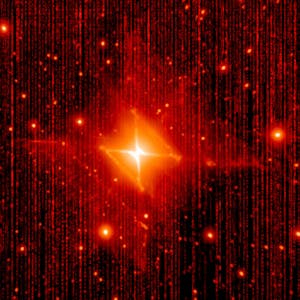Data-driven Astronomy
Science is undergoing a data explosion, and astronomy is leading the way. Modern telescopes produce terabytes of data per observation, and the simulations required to model our observable Universe push supercomputers to their limits. To analyse this data scientists need to be able to think computationally to solve problems. In this course you will investigate the challenges of working with large datasets: how to implement algorithms that work; how to use databases to manage your data; and how to learn from your data with machine learning tools. The focus is on practical skills - all the activities will be done in Python 3, a modern programming language used throughout astronomy.Regardless of whether you’re already a scientist, studying to become one, or just interested in how modern astronomy works ‘under the bonnet’, this course will help you explore astronomy: from planets, to pulsars to black holes.
Course outline:
Week 1: Thinking about data
- Principles of computational thinking
- Discovering pulsars in radio images
Week 2: Big data makes things slow
- How to work out the time complexity of algorithms
- Exploring the black holes at the centres of massive galaxies
Week 3: Querying data using SQL
- How to use databases to analyse your data
- Investigating exoplanets in other solar systems
Week 4: Managing your data
- How to set up databases to manage your data
- Exploring the lifecycle of stars in our Galaxy
Week 5: Learning from data: regression
- Using machine learning tools to investigate your data
- Calculating the redshifts of distant galaxies
Week 6: Learning from data: classification
- Using machine learning tools to classify your data
- Investigating different types of galaxies
Each week will also have an interview with a data-driven astronomy expert.
Note that some knowledge of Python is assumed, including variables, control structures, data structures, functions, and working with files.
None
Syllabus
Syllabus - What you will learn from this course
Week 1
Thinking about data
Week 2
Big data makes things slow
Week 3
Querying your data
Week 4
Managing your data
Week 5
Learning from data: regression
Week 6
Learning from data: classification
FAQ
When will I have access to the lectures and assignments?
Access to lectures and assignments depends on your type of enrollment. If you take a course in audit mode, you will be able to see most course materials for free. To access graded assignments and to earn a Certificate, you will need to purchase the Certificate experience, during or after your audit. If you don't see the audit option:
The course may not offer an audit option. You can try a Free Trial instead, or apply for Financial Aid.
The course may offer 'Full Course, No Certificate' instead. This option lets you see all course materials, submit required assessments, and get a final grade. This also means that you will not be able to purchase a Certificate experience.
What will I get if I purchase the Certificate?
When you purchase a Certificate you get access to all course materials, including graded assignments. Upon completing the course, your electronic Certificate will be added to your Accomplishments page - from there, you can print your Certificate or add it to your LinkedIn profile. If you only want to read and view the course content, you can audit the course for free.
Is financial aid available?
Yes. In select learning programs, you can apply for financial aid or a scholarship if you can’t afford the enrollment fee. If fin aid or scholarship is available for your learning program selection, you’ll find a link to apply on the description page.
What programming background is assumed?
We assume you are familiar with basic programming in a modern programming language including variables, control structures, data structures, functions, and working with files. In this course we will use Python 3.
We'll walk through all the examples and provide lots of support, so jump in and have a go. If haven't done any programming for a while, you might want to brush up before you start.
Reviews
This course is exceptionally good, well developed and structured. The content of the course is good. The teachers have demonstrated the concept well. I would like to learn more on this concept.
Really amazing course! Gave me insights into how data analysis works in the field of astronomy and how one can use different machine learning techniques to classify the huge amounts of data generated.
It's a nice and short intro to both astronomy and analysing data with python. For me it was a too short because I would like to learn more about this topic, but totally worth it.
An amazing course! Was a bit challenging at first, but it didn't take long for me to get the hang of it. Was quite interesting and informative throughout. Absolutely loved it!
